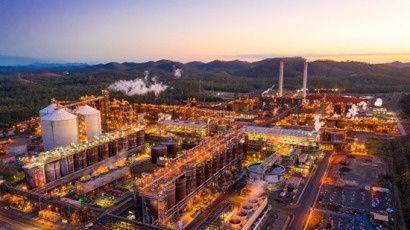
The $111.1 million ‘Rio Tinto and Sumitomo Corporation Yarwun Hydrogen Calcination Pilot Demonstration Program’ will be the first-of-its-kind deployment of hydrogen calcination in the world.
The project is intended to reduce emissions in alumina refining, which currently contributes roughly three per cent of Australia’s greenhouse gas emissions.
The project will consist of a 2.5 MW on site electrolyzer to supply hydrogen and a retrofit of one of the refinery’s calciners to operate with a hydrogen burner.
Sumitomo Corporation will own and operate the electrolyzer at Rio Tinto’s Yarwun site and supply the hydrogen to Rio Tinto directly. The electrolyser will have a production capacity of more than 250 tonnes of hydrogen annually.
Rio Tinto will conduct a series of tests of the hydrogen calciner under differing operating conditions to validate suitability and performance.
Calciners, which use high temperatures to extract chemically bound water from alumina crystals, traditionally use fossil fuels for process heat and contribute roughly 30% of emissions from alumina refining.
Sumitomo Corporation Energy Innovation Initiative Director, Seiji Kitajima said, “We are excited to be delivering this hydrogen project together with Rio Tinto as our long-term partner with the support of ARENA.
“Demonstrating real-world applications of hydrogen in industrial settings with motivated partners is essential to reducing carbon emissions and working toward our company’s vision of achieving carbon neutrality by 2050. Through this demonstration, Sumitomo Corporation aims to venture into the commercialization project to contribute to Rio Tinto’s decarbonization.”
“Sumitomo Corporation is proud to be working on yet another hydrogen project in Australia and contributing to Australia’s own emission reductions goals.”
Hydrogen calcination also produces high purity steam, which unlike contaminated steam from fossil fuel calcination, can be recycled for use in other stages of the refining process.
If successful, the project will demonstrate the viability of hydrogen calcination and pave the way for adoption at scale across other alumina refineries.
Rio Tinto Aluminium Pacific Operations Managing Director Armando Torres said, “This pilot plant is an important step in testing whether hydrogen can replace natural gas in Queensland alumina refineries.
“At Rio Tinto we have put the energy transition at the heart of our business strategy, and this is one of the ways we’re working towards decarbonising our operations.
“We are proud to be developing this new technology here in Gladstone, in partnership with Sumitomo Corporation, and with support from ARENA.”
The demonstration follows a successful feasibility study conducted by Rio Tinto, which ARENA supported with a $580,000 grant in 2021.
ARENA CEO Darren Miller said the project is an important step in the development for hydrogen calcination and the decarbonization of the alumina production process.
“This world-first pilot looks to prove a promising technology for decarbonizing one of our most emissions intensive industries,” Miller said.
“Having already backed an encouraging feasibility study, we’re excited to be working with Rio Tinto and Sumitomo Corporation to build on that success and trial hydrogen calcination in the field.
“If this pilot project is successful, it could be a game changer for Australian alumina production, paving the way for deployment across the industry, and underscoring the importance of low-cost green hydrogen to decarbonise our largest industrial emitters. ARENA will continue to support projects at this scale as we develop other larger programs, such as Hydrogen Headstart.”
Australia is the world’s largest exporter of alumina, the mineral feedstock for aluminum production, with the industry contributing $7.5 billion to the nation’s GDP.
ARENA’s Alumina Decarbonization Roadmap(the Alumina Roadmap), published in 2022, identified hydrogen calcination as one of four technologies that could reduce emissions from Australia’s alumina refineries by up to 98%.
ARENA has been investing in projects to reduce emissions from the aluminum value chain since 2021. This includes providing funding to Alcoa to investigate electric calcination and trial mechanical vapor recompression, two further technologies identified in the Alumina Roadmap.

